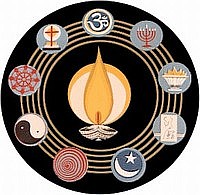
Meditation is not a new idea. It’s decidedly ancient and practised in many traditions, especially by monks and recluses. But, in modern times, meditation for ordinary householders became a vogue, exploding in popularity in the ‘swinging 60s’, which was when self-liberation became a byword for removing the life restraints working people had been subjected to previously. The timing of this new attitude coincided with our entry into the Aquarian Age, according to astrologers and mystics.
Moreover, the sudden rise in popularity of meditation brought up many doubts as to its claimed beneficial effectiveness, mostly by health professionals and religious top knobs. Scientific research thus quickly got under way and positive results ensued. All these studies can be found on the Internet and in books. Meditation is therefore now recommended by doctors and there’s an increasing demand for it in schools and work places.
People in the Western World come to meditation generally for one or more of the following for four reasons , viz:
- Simple curiosity possibly coupled with searching for greater spiritual fulfilment;
- De-stressing needed – it’s a superlative relaxation method;
- A wish to find a better way of life, given the intensive materialism mankind is experiencing;
- An alternative medicinal therapy sought, following unhappiness, ill health, setbacks or painful experiences.
GuruRaj said it matters not what reason you have for being drawn to meditation at a particular time. Regardless of one's circumstances or desires something rings true in your mind when the moment comes to explore any form of yoga. You might have done it in previous lifetimes too. You don’t have to accept this and it makes no difference what your beliefs are.
Meditation is calming, introspective and focusing. Alone, or coupled with any other yoga, it’s a useful tool for aligning oneself with one's inner nature; hence solutions arrive to the above reasons for enquiry.
But what does inner nature actually mean? It means that our minds have taken over from our natural way of being. Way back in time, mankind didn’t operate (each of us) with a ‘mind’. Humans lived mostly by instinct like animals, in line with their whole nature. Our whole nature, if we use it today, finds us using much greater degree of consciousness, inherent in everyone, and a much smaller use of intellect and ego. As Guruji put it, “When man first found his own reflection in the water, he introduced the idea of me and mine – and that’s when all the trouble started!”
As the mind grew, our inherent nature became obscured. You can read at this site how the mind’s framework positions the ego and the intellect, which create barriers and a continuous vortex of confusion; going nowhere. The mind is only a matrix of energy particles of course but it carries forward a bundle of impressions, which cause all our worries and most of our ills.
In short, meditation helps renew our outlook by slicing through the jungle of impression to the clear unadulterated self. It helps us imbibe more of our true nature and let go of self-strangulating patterns. This is achieved by taming the intellect and stretching the ego so that the ego can be seen through, when it becomes a useful servant rather than a dominating master.
A meditator doesn’t have to change his / her lifestyle; just experience the refreshing benefits of some of the following:
- Physical & mental relaxation; unwinding
- Increased ability to deal with everyday challenges with ease
- Development of the intuitive faculty
- More open & understanding relationships
- Greater understanding of self and others
- Improved focus
- Improved health, as life becomes less stressful
- A more contented and confident personality
- A greater understanding of, and meaning to, life
- A better understanding of individual beliefs and/or philosophy of life
- Fear of death subsides.
Meditation practise is covered elsewhere in this website. You can click the appropriate buttons on the Home Page.
When a person starts to meditate it’s usual to quickly feel somewhat renewed - re-discovered, rather - because of the calming response and refreshed outlook. Also, it’s often as if something is known but not identified; a ‘just right’ or ‘something’s OK here’ feeling. This is subtle and sometimes quite delightful but not much compared to the potential benefits still to come.
Understanding the universal teachings behind meditation then becomes more or less a desire in most meditators. That’s good too because understanding subjects like conscious effort, acceptance, discrimination and non-attachment and self-responsibility are part and parcel of the competence to move farther forward into new and reconditioned (and ‘unconditioned’) life. There is no end to one’s potential, right up to self-realisation – if that is one’s wish. You can go as far as you like or stop wherever you like, in terms of letting go of old patternings.
Fortuitously, science has taken great steps in recent decades in terms of confirming what the mystics have said for millennia. So it’s no longer necessary to trust or believe when it comes to accepting what existence really is and where we fit in - which is the secret to successful meditation. Particularly, in this regard, 1) all solid matter is ‘empty’; 2) nothing stays the same – not even for a millisecond; all that appears disappears, 3) our perceptions, including space-time, are created by our minds; and 4) the ultimate is-ness is pure consciousness – is a boundary-less infinity.
The world is our oyster, our potential unrestricted, if we allow meditation to help us take on these four truths (Buddhists call them ‘seals’). There’s no looking back to pain, bad luck or misfortune once we hold these truths in view.
